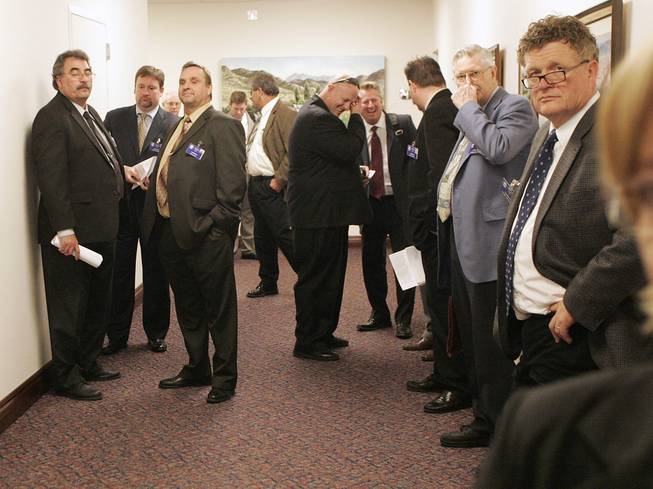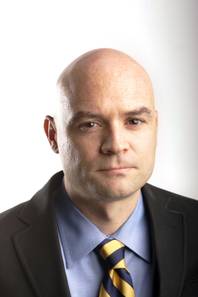
Lobbyists congregate in a hallway on Day 3 of the special legislative session Thursday, Feb. 25, 2010, in Carson City.
Sunday, Feb. 3, 2013 | 2 a.m.
View more of the Sun's opinion section

J. Patrick Coolican
Related Stories
- Nevada lawmakers playing nice may stick to status quo (02-03-2013
- Partisan loyalties, personal ambitions to complicate legislative compromise (02-03-2013)
- Want a real-time window to the Legislature? Follow our Twitter guide (02-02-2013)
- With staff changeover, Sandoval administration loses ties to Legislature (02-01-2013)
- Gun control, death penalty among social issues before Nevada lawmakers (02-01-2013)
- More columns by J. Patrick Coolican
- More Sun political news
Just after the 2008 election, in which then-Sen. Barack Obama had unleashed a political machine the likes of which had never been witnessed in Nevada, I met with a prominent lobbyist to talk about the Legislature.
I wondered — naively, in retrospect — if all that grass-roots energy would be harnessed in the upcoming legislative session. It wasn’t a crazy idea. Obama had 1,200 precinct captains and 4,500 volunteers. They even met at house parties around the valley after the election to decide how to use their new power.
My lobbyist source, jaded and cynical and corpulently rich, was dismissive.
“This thing is gonna be run by 200 people,” he said, referring to the gang of power lobbyists and influential legislators, business executives and labor leaders who would lean strongly into the lawmaking process. “And then, when it comes down to it, it’s gonna really be run by 20 people.”
And boy was he right. Obama went to the White House to deal with the economic crisis and his organization mostly dissolved. Some volunteers remained active, but most, without leadership, merely watched, or probably didn’t watch, as the Nevada Legislature did its level best to triage the ongoing calamity of the state’s fortunes. And sure enough, in the end, all the decisions were made by the same small crowd.
Grass-roots energy isn’t just a left-of-center phenomenon. After the rise of the Tea Party, to which Gov. Brian Sandoval catered his campaign, one might have thought conservative activists would win steep cuts in social services and taxes and push for an Arizona-style immigration law. Instead, Sandoval avoided immigration and agreed to keep taxes that had been set to expire. And the state stumbled along, much as before, according to the ingenious stratagems of the same 200 people, most of whom were the same cast from two years before, and quite a few of whom were the same from 10 years before that.
It’s theirs.
“It’s all inside baseball,” another lobbyist told me last week, as if I needed reminding.
Many, perhaps even most, states are run this way, but there are few places where it’s so pronounced as in Nevada.
There are many reasons this is so, but the most important is a sheer accident of history: distance.
Most of us, 70 percent or more, live in Las Vegas, which is 450 miles from the state capital, Carson City. It would be as if the people of Massachusetts were represented by a legislature that meets in Harrisburg, Pa.
Although the geography has been bridged by webcasts and social media, face-to-face meetings are still the most effective way to persuade. Despite what you may think, there aren’t bags of cash being dropped in the offices of legislators, and I doubt lawmakers are influenced by dinners in the capital’s two main eating haunts. The influence game is far more subtle and insidious. It’s expertise. Lobbyists for the Strip bring years — often decades — of experience around the legal, tax, policy and regulatory issues at stake. The same is true in mining, health care, electricity and water. It’s simple: They bring compelling arguments.
The legislators, meeting every other year for 120 days, are inundated with information and have limited time and staff to sort through it all. With term limits, the ability to develop expertise about complicated issues such as electric utility law, which can take years of close study, is gone.
And there’s no way to say this without sounding condescending, but here goes: Many legislators just aren’t equipped to deal with the flood of bad data and sophistry that comes their way in the form of bought-and-paid-for arguments of the state’s powerful interests.
Who can afford to bring this expertise? Who can afford to gather the data, hire persuasive lobbyists and fly them up to Carson City every week to make the argument?
The same interests that can afford to write big campaign checks once the legislative session is finished and the lawmakers need money for re-election or the next elective office.
We’re talking mostly about corporations and labor unions.
Do either corporations or labor unions represent your interests?
In 2008, Thomas Frank wrote a book called “The Wrecking Crew,” which was about how Washington had become captive to the special interest lobbying class and its Republican allies. It sure felt true during the Bush years, but Nicholas Lemann wrote a compelling critique in which he examined the entire notion of “special interests” as explained by early 20th-century political thinker Arthur Bentley in “The Process of Government: A Study of Social Pressures.”
Bentley argued that politics and governance are nothing more than the shifting alliances, deal-making, and victory and defeat of interest groups. We aren’t a collective body politic. We’re just a bunch of interest groups.
People inveigh against “special interests,” but what they’re really protesting is that some interest is in opposition to their own interest. They then call this political opponent a “special interest.”
So, for example, parents with children in school say the “special interests” should pay more in taxes for better schools. Meanwhile, however, the shareholders of mining companies could just as easily say parents are a “special interest” who want to reduce the mining industry’s hard-earned profit.
There is no common good. See, we’re all part of “special interest” groups, often several, so we’re all represented in some way in Carson City.
Politics is merely the task of sorting out the winners from the losers.
I often hear this deeply cynical view of government from insiders. And it’s hard to argue with it when you see it happen every other year for 120 days.
Indeed, as for now, wealthy corporations are a more powerful interest group than the parents of school-aged children, but rather than moralizing about how our government is under the thumb of the special interests, you should just focus on playing the game better than other interests do. The way to do that is to convince legislators that your interest, be it as the parent of a child in public school or the shareholder of a mining company, deserves to win out over the others.
In practical terms, what does that mean?
It means paying attention to what they’re doing in Carson City and organizing your friends, neighbors and co-workers. Legislators listen to voters, so you need to get them organized, then cajole and browbeat and ultimately convince lawmakers with emails and postcards and phone calls and, if possible, trips to the Legislature. It’s hard work. But if you don’t do it, here’s what will happen: Those same 200 people will make all the decisions about the state’s future. Of that, I can assure you.

Join the Discussion:
Check this out for a full explanation of our conversion to the LiveFyre commenting system and instructions on how to sign up for an account.
Full comments policy